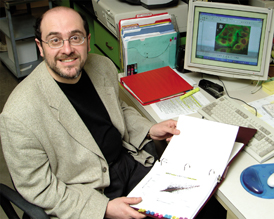 |
Alexander “Sasha” Kabanov, Ph.D. |
The Fourth International Nanomedicine Drug Delivery Symposium will be hosted by UNMC at Embassy Suites in the Old Market. The symposium will attract about 150 participants, including top scientists in the field of nanomedicine drug delivery.
Nanomedicine combines engineering with the pharmaceutical and medical sciences in revolutionary ways that could more effectively deliver drugs to treat cancer, neurodegenerative disorders and other diseases. One outcome of nanomedicine is the use of tiny particles much smaller than a cell, for therapeutic drug delivery directly to the affected site.
“The use of nanomaterials and devices promises breakthroughs in difficult to treat diseases in this century,” said Alexander “Sasha” Kabanov, Ph.D., professor of pharmaceutical sciences, UNMC College of Pharmacy, and chair of the symposium. “Our work is focused on finding better and more effective ways of delivering therapies, for example, cancer drugs that target tumors and spare healthy cells. Several therapies using nanomaterials are approved for clinical use and many more are being evaluated.”
In the case of cancer drugs, one goal of nanomedicine is to eliminate some of the devastating side effects that come with current treatments.
UNMC hosted the first international symposium on nanomedicine in 2003 in Omaha.
“UNMC is honored to host international academic and industrial scientists, as well as students, physicians and entrepreneurs. UNMC is becoming a world player in nanomedicine research,” said Dr. Kabanov, director of the Center for Drug Delivery and Nanomedicine. “Some of the world’s leading authorities in nanomedicine research will be speaking at the symposium and sharing new ideas. We will have in attendance a substantial group of graduate students locally and nationally. These students are our future, our most dynamic minds.”
Clarence Ueda, Ph.D., dean of the UNMC College of Pharmacy, said having the international symposium at UNMC is important.
“By serving as the host city and campus, the symposium will put Omaha and UNMC on the ‘radar screen’ with nanomedicine researchers around the world,” Dr. Ueda said. “That’s what being world-class is all about. The symposium provides a means to showcase not only the outstanding work that is going on at UNMC in the nanomedicine drug-delivery field, but also the hospitality of the Midwest.”
Universities represented will include prestigious institutions such as Johns Hopkins University, Princeton University, Yale University, and Duke University. Representatives from universities in Canada, Spain, Belgium, the United Kingdom and Germany also will participate. A number of top scientists in nanomedicine will speak, including Kazunori Kataoka Ph.D., of the University of Tokyo, Vladimir Torchilin, Ph.D. of Northeastern University in Boston and Jindrich (Henry) Kopecek, Ph.D., University of Utah.
Dr. Kopecek said nanomedicine drug delivery shows promise in treatment of cancer and other diseases.
“Chemotherapeutic agents cause side effects because they kill healthy cells as well as tumors. Thus, it is essential to make drugs more effective and more specific. Polymeric nanomedicines are capable of overcoming these problems by guiding drugs precisely to tumor cells,” said Dr. Kopecek, Distinguished Professor of Bioengineering, University of Utah Department of Pharmaceutics and Pharmaceutical Chemistry.
Howard Gendelman, M.D., a UNMC researcher who will speak at the conference, uses nanotechnology in hopes of finding better treatments for HIV-1 infection. He said many in health care delivery see nanomedicine as the future of medicine.
“From computational databases, education, diagnostics, therapeutics and outcome assessments, nanomedicine is emerging as a dominant force in patient-oriented care,” said Dr. Gendelman, chair, department of pharmacology and experimental neuroscience and director of the UNMC Center for Neurovirology and Neurodegenerative Disorders. “With regards to saving lives, nanomedicine offers the distinct advantage of targeting disease areas specifically, to limit side effects, to lower dosing intervals and to improve therapeutic outcomes. It is already bearing fruit in cancer chemotherapy but is evolving as a discipline for infectious diseases, degenerative disorders and neurological maladies.”
Part of Dr. Kabanov’s nanomedicine research involves drug formulations that may overcome barriers of drug resistance in many cancers. Funded by several federal grants, Dr. Kabanov already has co-invented a polymer formulation that has achieved up to 1,000 times more effectiveness against drug-resistant tumor cells than doxorubicin, a widely used chemotherapeutic agent. Dr. Kabanov’s polymer formulation of doxorubicin recently completed Phase II clinical trials in the United Kingdom.
“The citizens of our state can be rightfully proud the medical center is hosting a gathering like this,” Dr. Kabanov said. “One of the reasons is the growth of UNMC, which is due in large part to the generosity and support we receive from the community.
“It shows Nebraskans respect innovation and education. Only through this support can we attract and retain scientists who can go any place in the world,” Dr. Kabanov said.
Besides Dr. Kabanov, symposium organizing committee members are UNMC faculty, Tatiana Bronich, Ph.D., UNMC, Vinod Labhasetwar, Ph.D., and Dennis Robinson, Ph.D., and Surya Mallapragada, Ph.D., of Iowa State University.